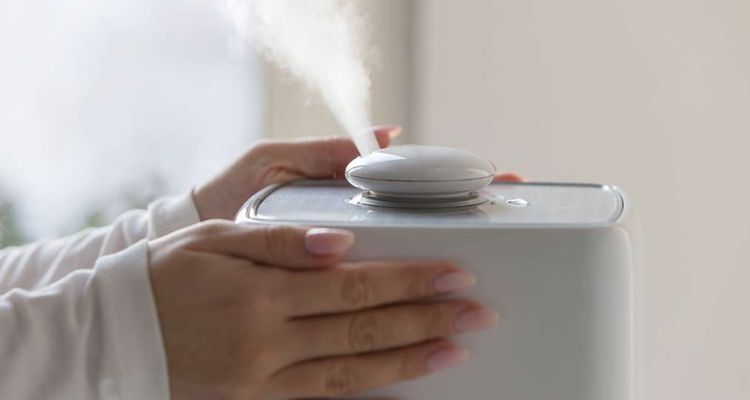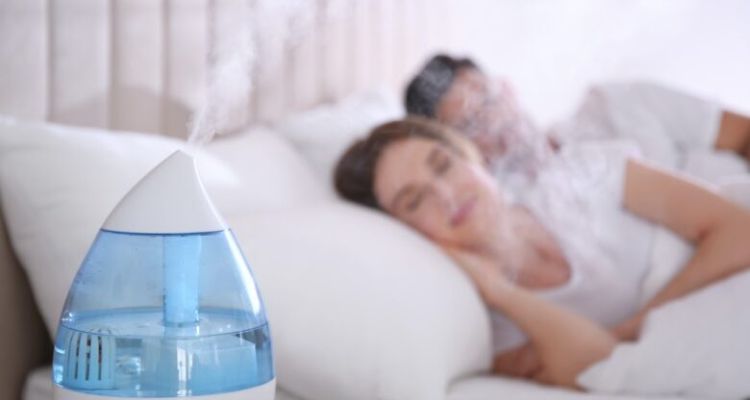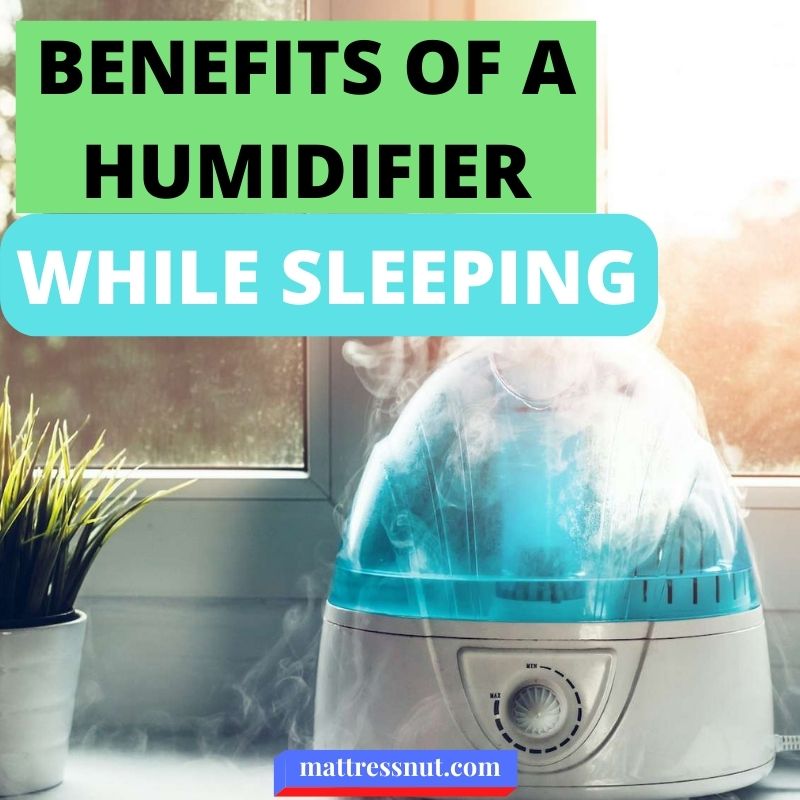It’s fun being cozy in bed on cold winter nights, sipping hot chocolate, and watching a movie. But winter also brings dryness to the air and a lot of problems associated with dry air. Like unhealthy skin, chapped lips, cracked heels, and dry throat. In worst cases, it leads to nasal and throat infections. So, what is the solution to that? A humidifier is a perfect solution that keeps moisture in the air so you can enjoy the winter nights as you wish (also check the top rated bed sheets for winter).
In the following post, you will know the benefits of using a humidifier, its types, and if there are any downfalls to using a humidifier.
Read till the end to find out more.
What Are the Benefits of Using a Humidifier During Sleep?
Consistent inhaling of dry air keeps the nasal and throat passage dry, which leads to inflammation. A humidifier keeps that from happening to you. The constant flow of humidity in the air keeps moisturizing the skin, nose, and throat, preventing the bacteria from attacking your respiratory system.

You can prevent the following from happening to you if you use a humidifier.
Congestion
Ever wonder why you have a stuffy nose or your voice suddenly stops as you feel something stuck in your throat? This is due to excessive mucus forming around your nose’s blood vessels and tissues, making them swollen. Same is the reason for chest congestion when your chest is filled with phlegm. This results from allergies, colds, sinus issues, or polluted air around you. Worst cases of congestion may lead to Asthma, Cystic Fibrosis, or Chronic Obstructive Pulmonary Disease.
Most of the congestion happens in winter when the bacteria are highly active in the dry air. Apart from keeping yourself hydrated, using a humidifier can minimize congestion from happening in the first place. It keeps throwing water vapors in the air to keep the air humid. It protects your nose from drying and helps keep the natural moisture in your nose active.
Dry skin and keeps the hair moist
Most humans have natural moisturizing enzymes in their skin that keeps it from drying. The moisture in the air keeps the skin moisturized. However, those enzymes will dry out if exposed to dry air. In that instance, your skin will develop cracks, small flakes, and dry patches. Most of the time, these patches are itchy, which leads to more skin complications. In worst cases, dry skin syndrome can lead to rashes, bacterial infections, or eczema. A humidifier prevents that from happening on a large scale.
Similarly, the skin on your head becomes itchy in dry weather. Furthermore, the bacteria present in the dry air develop dandruff on the head skin, which destroys the hair follicles. This condition may result in hair fall and baldness. A moisturized air will keep the moisture of your head skin active, thereby protecting your pretty hair.
Infections, microorganisms, and allergies
A humidifier prevents the bacteria or other viruses in the dry air from attacking our respiratory system. The air fumes extracted from the humidifier keep these microorganisms away from entering our nasal passageway. Therefore, there is less chance of getting any bacterial infection or an allergic reaction.
Snoring
Snoring can be annoying for your partner when you sleep. However, if there is no medical reason, it is a natural phenomenon, and you cannot control it. The reason we snore is due to disturbance in airflow in our bodies. This air turbulence causes vibration in our mouths; hence we snore.
In most cases, the turbulent air results from narrow pathways in the nasal cavity. As we know, tissues and blood vessels in the nose get trapped and swollen if there is excess mucus. This mucus is the result of dry weather or any allergies. Having a humidifier can bring a trickledown impact on the lungs in a positive way.
Asthma attacks
If you have asthma, dry air is not suitable for you. When we inhale dry air, it dries nasal or mouth cavities and affects the lungs. Our body produces natural moisture in our respiratory tract for proper lung function. Inhaling dry air will affect this mucus, and the body will produce excessive mucus to cover the dryness. This excessive mucus will cause tissue inflammation. Ultimately, there will be an obstruction in breathing. Hence, a possible asthma attack.
Keeping your humidifier operational throughout the night will produce enough moisture in the air that you can breathe easily.
Irritation of eyes
Another issue with dry air is that it affects the eyes. Upon focusing on your eyes, you will find that the outermost layer of your eyes is moist. This natural moisture is necessary to keep your eyes clean and clear the lens in your eyes. If there is any dryness in your eyes, you will feel an uncontrollable itch. When they are dry, the itching in the eyes is so extreme that you cannot resist rubbing. And, consistent eye rubbing will further damage your eyes. This happens when you are in a dry atmosphere.
The humidifier can reduce your eye irritation while it’s operating.
Headaches
Another problem connected with dry air is headaches. You can get headaches due to so many reasons. For example, high fever, nausea, lack of sleep, nasal irritation, influenza, etc. However, headaches associated with dry air is due to dryness of the air track from the nose to the lungs. The internal moisturizing system remains active throughout life. However, if the external air is hot, it will dry the mucus membranes. The dry membrane causes inflammation and stops the blood flow in the sinuses, which puts pressure on the brain and causes headaches.
Chapped lips
Dry air affects breathing and severely affects the skin and lips. When your sinuses are blocked due to inflammation, you will have trouble breathing through the nose. Your throat pathway will eventually dry out due to inhaling dry air. The impact is not only on breathing but also on the dryness of the inner mouth.
If your lips are cracked and you want an overnight relief, switch on your humidifier and let it do the miracle for your lips.
Cough
Using a humidifier overnight maintains the moisture level in the air. The humidifier is mostly beneficial in dry weather, like winter. It is recommended that the atmosphere inside your house or room should have a moisture level of 30% to 50%. If the moisture level is not in range, it can cause sinuses and allergies. When dry air enters the lungs via the nose or mouth, the lungs’ performance is affected. Resultantly, you get a dry cough. In worst cases, if your chest is covered with phlegm, there is a chance that sputum excretes with your cough.
Healthy lungs work correctly when they are moist, and a humidifier can do that for you in dry weather.
Bleeding through nose
Once you switch on your room humidifier before you sleep, you ensure that enough moisture is present in the air so you can enjoy a cozy sleep. The mist from the humidifier keeps your skin moist and your breathing comfortable. 30% to 50% humidity level in your bedroom supports the moisture level in your sinuses and respiratory tract. It, therefore, prevents nasal tissues and mucus glands from inflammation and bleeding.
Types of Humidifiers
Warm Mist Humidifiers
A warm mist humidifier works the same, just as any other. The only difference is that they eject warm mist to enhance air moisture. The water boils inside the humidifier and turns into a warm mist before release. They tend to keep the air healthy. The high-temperature mist is effective against air-borne bacteria and molds. The air humidification process is not disturbing as no fan is inside them.
Normally, these humidifiers are suitable for single-room use. However, they are an expensive option. Be careful when using it around your children because it contains hot water and ejects hot air.

Cool Mist Humidifiers
If you don’t like hot air in your room, a cool mist humidifier is the best option. These humidifiers maintain your room temperature with their mist. There are two options when choosing the cool mist humidifier. One with a fan that evaporates water in the room in the form of mist, and the other uses a vibration technology that produces mist with the help of vibrations. This cool mist is then immersed in the air for moisture.
Since the cool mist is blown, these humidifiers are not harmful to children. On the budget side, these can be an expensive option. However, the benefits subside the cost because one cool mist humidifier is enough for a larger area or a full house and requires less energy consumption to operate.
Evaporative Humidifiers
These humidifiers are impeccable for your bedroom as they come in a single unit. The flow of air is controlled with the help of fans installed in the device. To flow the moisture in the air, a special moisture filter is used.
The evaporative humidifiers are a relatively cheaper option. There is a downside to these devices. It isn’t easy to control the level of moisture with these humidifiers. Excess humidity can result in allergies and asthma due to dust mite issues and mold development.
Impeller Humidifiers
As the name suggests, these humidifiers come with rotating discs that blow moisture in the air in the form of mist. The high-speed impellers keep the moist cool when it ejects in the air. The additional advantage of these humidifiers is that they are safe to operate around children. They are not so expensive to buy, and you can choose from different mist types according to the requirement.
However, it isn’t easy to control the moisture level with these humidifiers. Excessive humidity is not suitable for your health.
Potential Downsides to Keeping the Humidifier on During the Night
Risk Of Fire
A room humidifier is a compact size device that is built to excrete consistent mist in the air for humidification. It is better to operate throughout the night to maintain moisture in the air.
However, the risk of fire due to short-circuit is quite possible with operational electrical appliances. The same is the case with the humidifier. If there is any distortion in the supply of volts to the humidifier, there is a chance that it causes fire to the nearby things.
Further, fire risk is quite possible using a warm mist humidifier. As this particular type of humidifier works by boiling water, it can become devastating if you don’t handle it with care. Moreover, this is important because boiled water can cause a fire if you keep this humidifier on the fabric, like the rug.
Dirt Build-Up
Excessive use of humidifiers results in dirt build-up in its tank. This is because the humidifier evaporates mist from the water stored in its tank. Normally, water contains different minerals like calcium, magnesium, and iron. After the mist is extracted, the remaining minerals in the water are left behind. These clustered minerals provide a suitable environment for certain bacteria and block the humidifier’s mist flow.
Proper cleaning of the humidifier with the help of bleach or solutions suggested by your vendor is essential for the better performance of your humidifier.
Key Takeaways: Benefits Of Using A Humidifier While Sleeping
The Main Advantages
A humidifier addresses the challenges of dry air during winter, such as unhealthy skin, chapped lips, and throat issues. More importantly, it prevents nasal and throat infections by maintaining moisture in the air.
Health Benefits
By using a humidifier, you reduce the risks of congestion caused by dry air, which in turn can lead to severe conditions like asthma. It aids in maintaining skin and hair moisture, reducing the chances of skin complications like eczema and hair issues like dandruff. The appliance also minimizes the possibilities of infections, snoring, asthma attacks, eye irritation, headaches, chapped lips, and nasal bleeding.
Types of Humidifiers
There are several types of humidifiers available, each with its own advantages. Warm mist humidifiers emit warm mist and can kill airborne bacteria. Cool mist humidifiers are ideal for those who prefer a cooler room atmosphere. Evaporative humidifiers are affordable but can’t control moisture levels well, while impeller humidifiers use high-speed impellers and are safe for children.
Potential Risks
While humidifiers have numerous benefits, there are also potential downsides. There’s a risk of fire, especially with warm mist humidifiers. Over time, minerals from the water can build up in the humidifier, leading to bacterial growth if not cleaned regularly.
Conclusion:
To conclude, humidifiers are essential home appliances if you live in dry air. After reading this article, you know they have many health benefits. Before buying your first humidifier, you can make an educated decision now. The humidifier is your solution if you suffer from asthma or sinus problems.
Benefits of a humidifier while sleeping FAQs
Is It Good to Sleep with A Humidifier Every Night?
Usually, humidifiers are recommended in dry weather, like winters. Using a humidifier at night throughout the year is not beneficial. However, it is recommended to use it every winter night. The dry air can affect your sinuses and cause allergies. The mist from your humidifier can prevent this from happening to you.
Is A Humidifier Good for The Lungs?
Yes. Lungs perform to their maximum efficiency when the whole respiratory tract is moist. In dry weather, using a humidifier ensures moistness in your lungs and breathing track. Hence, better breathing while sleeping.
Can You Use Tap Water in A Humidifier?
Using distilled water in your humidifier is recommended for less mineral storage. Tap water has different levels and grades of minerals according to your location. These minerals build up to form clusters which are ideal for bacteria generation. Although distilled water has fewer minerals, regular cleaning of your humidifier is necessary in any case.
How Long Should You Run a Humidifier In A Bedroom?
The biggest risk of using a humidifier is the excessive humidity in the air. To prevent that, limiting the use of a humidifier in your room is essential. Ideally, 8-12 hours of usage is enough for a suitable humidity level.

